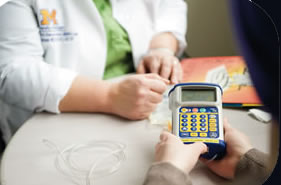Caring For Your Own
NOTE: The services described in this article now take place as part of a patient's clinic visit. They do not happen at a separate location.
Rogel Cancer Center Education Center, also known as the Skills Lab, empowers families to be partners in cancer treatment
Our goal is to help patients and families feel more comfortable about caring for themselves at home.
--Debby Roisen, Nurse Educator

Domenico Colapietro received his first round of chemotherapy while he was in the hospital recovering from surgery for lung cancer. The treatment had caused him to lose much of his thick, curly hair and he already had his prescription for anti-nausea medication.
But the next round -- like most rounds of chemotherapy -- would be delivered in one of the University of Michigan Rogel Cancer Center's outpatient infusion areas. There would be no nurse to monitor him once he returned home to Romulus. That's why Colapietro and his son, Salvatore, and daughter, Angela, were meeting with a Rogel Cancer Center Education Center nurse.
As cancer care has advanced, more and more of it can be delivered on an outpatient basis. While it's a shift that has its benefits -- both in terms of cost and personal comfort -- it has required families to learn how to handle a variety of medical concerns at home.
That's where the Rogel Cancer Center Education Center comes in. The Education Center provides one-on-one education to patients and families, who are often overwhelmed by all the information that comes with a cancer diagnosis, says Debby Roisen, a nurse educator who heads the Rogel Cancer Center Education Center.
"Our goal is to help patients and families feel more comfortable about caring for themselves at home," Roisen said. "We educate them so that they feel empowered to be a true partner in their own health care."
The nurses who work in the lab provide patient training on a variety of home health-care needs, including instruction on how to handle a continuous chemotherapy pump, how to take care of intravenous ports, how to give injections and how to monitor blood sugar levels.
The Colapietros are in the Education Center for the clinic's best known service: new infusion training. Louise Rushlow, an Education Center nurse, is explaining what the Colapietros should expect during chemotherapy treatment. She's offering helpful tips and advice. And, most importantly, she's teaching them how to distinguish expected side effects from serious reactions that warrant medical attention.
Toward the end of their talk, Rushlow pulls out a worksheet that the Rogel Cancer Center offers families to help divvy up the responsibilities of home health care. Before she finishes explaining it, the Colapietros begin to laugh.
"We've already got that down!" Salvatore Colapietro says.
Treatment Tips
We asked Debby Roisen, a nurse educator who heads the Rogel Cancer Center Education Center, for her best advice for families who are dealing with outpatient chemotherapy. Here's a round-up of her suggestions.
Buy a good thermometer.
It's important to take your temperature. If it ever goes above 101 degrees Fahrenheit, call your doctor.
Buy anti-bacterial body wash.
Don't use bar soaps that can harbor bacteria.
Keep hand sanitizer nearby.
You want to keep germs at bay, but you might not feel up to going to the sink frequently to wash your hands. Hand sanitizer can be a good alternative for times when your hands aren't visibly dirty.
Eat well.
It's important to maintain your weight during treatment. Eat before appointments, but avoid spicy or greasy foods that may cause indigestion. If you're having trouble with your appetite, consider consulting with a Rogel Cancer Center dietitian.
Opt for gentle dental care.
Buy a new, soft toothbrush.
Drink plenty of fluids.
This is especially important before appointments. It'll make it easier for nurses to find veins for treatment. Remember to drink extra water if you have coffee, which can cause you to lose fluids.
Use paper towels to dry hands.
Communal hand towels should be avoided.
Step back and ask for help.
If you're feeling overwhelmed, the Rogel Cancer Center has many options to help. Ask your doctor for a referral to the Rogel Cancer Center Education Center if you need a refresher course on something. Or, if you're feeling stressed, consider an appointment in our PsychOncology Clinic. Our therapists are trained specifically to help families cope with the strain of cancer and its treatment.
Read the Spring, 2010 issue of Thrive.
